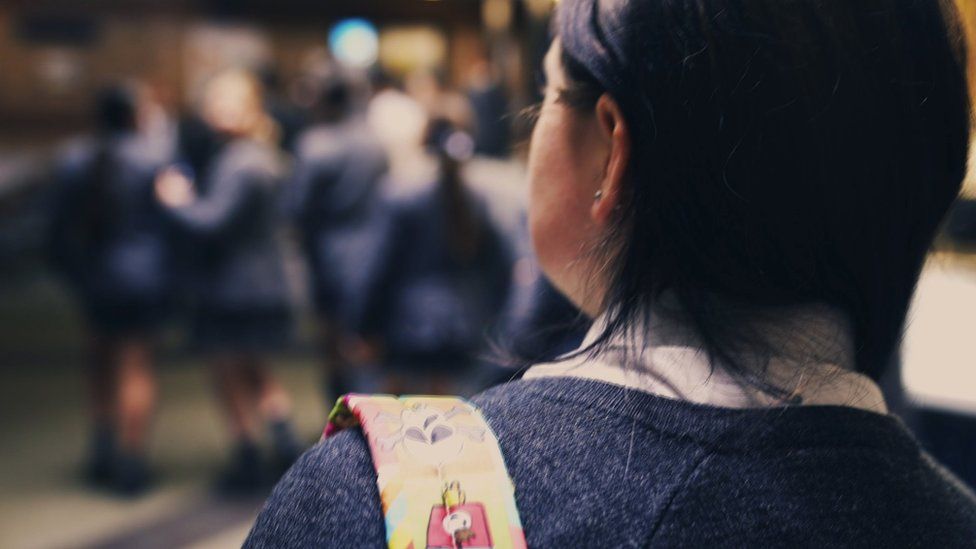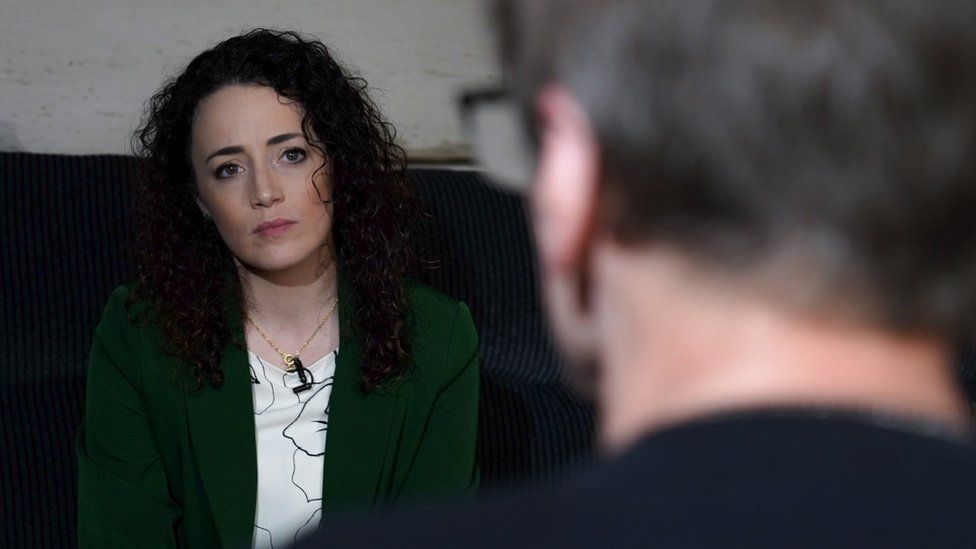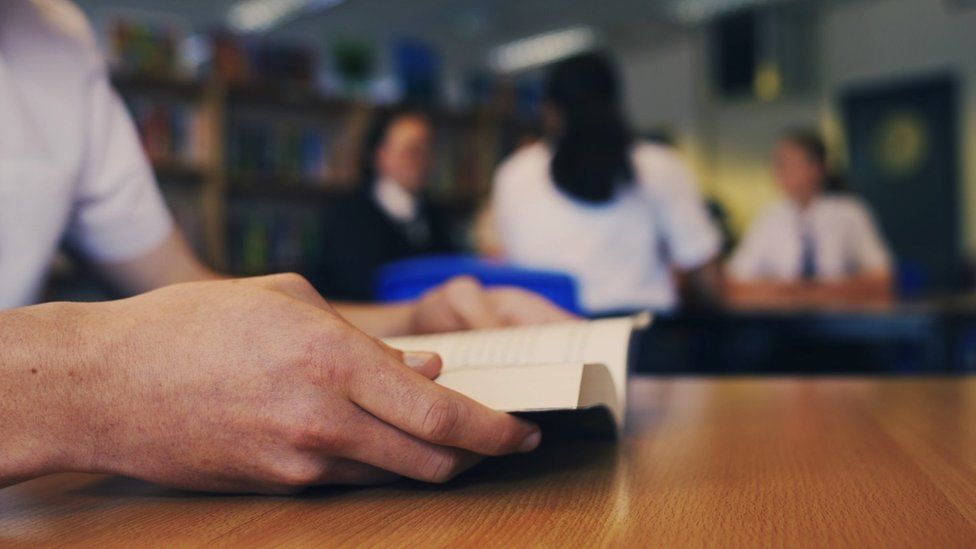As pupils settle into a new academic year, BBC News has spoken to two parents whose children have questioned their gender about the impact the lack of transgender guidance for schools has had on their families.
It is more than five years since the government first promised schools in England these guidelines - on issues including what toilets and changing rooms pupils use, where they sleep on residential trips, and when to involve parents.
Many families we spoke to didn't want to be interviewed. The names of the families we did interview have been changed to protect their privacy. We have used the same pronouns both parents did when talking about their children, whose birth sex is both female.
At the age of 16, Briony told her parents she identified as non-binary, and wanted to be known by a different name and use they/them pronouns.
Briony's mum, Rachel, had been concerned about her daughter's mental wellbeing for several months and could see she was struggling with something - but it still came as a shock.
Rather than accepting it immediately, Rachel felt it was important to explore and understand why Briony felt this way. But when she spoke to Briony's all-girls school, she was told staff and pupils there already knew and had been following Briony's request for months.
"They had just gone along with it - I was shocked by that. There was no clinical or medical input," Rachel says. "What the school has done by taking the actions they did undermined my parental responsibility. It's not for them to make those decisions."

Rachel believes there should have been an integrated approach - involving Briony, her parents, her school and medical professionals - and because there wasn't, her daughter has not received the right support.
She says Briony diagnosed herself as having gender dysphoria, which is a sense of unease a person can feel over a mismatch between their birth sex and gender identity, and teachers "didn't ask any questions".
"My concern is this could have a more lasting impact on her that could cement her way of thinking, rather than giving her the time to explore how she's really feeling and why," Rachel says.
"I want to make sure she doesn't do anything that's not right for her at the age of 16."
Rachel says the school felt it wasn't appropriate to speak to her about the issues until Briony was ready.
Teachers told her they later consulted lawyers and were concerned that refusing her child's wishes, on the basis of Rachel's lack of consent, could be considered discrimination under equalities law.
Rachel says Briony has since reverted back to the pronouns she/her, and is currently waiting for a neurodiversity assessment.
"I can't remember the last time I had a good night's sleep," she says. "It's very difficult - you want the best for your child and when you see them struggling, you just want to help them."
Mike, whose child is transgender, does not think teachers should have to tell parents if a pupil identifies as trans or non-binary, without the child's consent. He says it could put them at risk of being rejected by their families.
"Schools should be a place of safety and they have a legal duty of care to every child," Mike says. "I don't think a school should go against the child's wishes."
He says it was a surprise when Sam, who is autistic, told the family at the age of 12 that he wanted to use a different name and he/him pronouns - but says they were fully supportive.
Mike and his wife informed Sam's school, and staff agreed to the changes.
But he says teachers acted like the request was related to Sam's mental health and didn't have adequate policies in place to help Sam feel comfortable.
One teacher asked "invasive" questions about using breast binders and having periods which, he says, Sam found "acutely embarrassing" - but Mike says Sam wasn't given any advice and received no further support.
He was told to use the disabled toilets, and to change for PE inside a toilet cubicle in the girl's changing room.
But Mike says Sam felt excluded from the discussion and would have been much happier using facilities with a gender-neutral sign.
"He should have been having regular ongoing support from somebody in the school," Mike says.

When Sam began to be bullied by other pupils, Mike says the school didn't deal with it appropriately. "His mental health suffered enormously. He started having panic attacks and wouldn't go out in public," he says.
It was "absolutely devastating" to then discover that Sam had started self-harming, Mike says. This led to him moving his child to a new school.
Mike says he does not think this would have happened if all schools followed the same "inclusive guidance". He wants parents and teachers to talk about the best way to ensure transgender children are cared for and respected.
"We are talking about a very small number of people who are transgender, and I think that schools need to consider this," Mike says.

As many as two-thirds of secondary school teachers teach pupils who identify as transgender or non-binary, but until guidance for schools is issued, schools must make decisions on a case by case basis - balancing the needs of every pupil, while following equalities law.
One of the most contentious issues is whether schools should support social transitioning - changing appearance, name or pronouns to match a person's gender identity.
Last year, an independent review said social transitioning was not a "neutral act", but nor was "doing nothing", and better information was needed about its outcomes.
Just days before the end of last term, the government's own lawyer, attorney general Victoria Prentis, advised that giving guidance that allows teachers to ban children from socially transitioning could be unlawful.
The Children's Commissioner, Rachel De Souza says headteachers, families and children are "crying out" for clarity on the issue.
She said: "We can't have everyone doing different things, it's got to be fair for all children.
"I absolutely need that guidance out to children, families and schools as soon as possible, for clarity, for fairness and for good safeguarding."
Julie McCulloch, the director of policy at the Association of School and College leaders, says teachers in England are being let down.
"These parents' accounts indicate the types of situations schools are having to navigate and the very different views that children and parents have," she says. "It's a dereliction of duty on behalf of the government. It's a highly politicised issue that's become quite toxic."

The government first promised guidance for schools in 2018 - but missed its own deadline to publish a draft version last term.
The education secretary, Gillian Keegan, says the Department for Education (DfE) is taking more time to ensure the guidance gives clarity to teachers and reassures parents in what is a "delicate and sensitive area".
A DfE spokesperson said Ms Keegan was working "closely" with minister for women and equalities, Kemi Badenoch.
The spokesperson added: "We've been repeatedly clear about the importance of biological sex and we advise that schools and colleges proceed with caution - prioritising the safeguarding and wellbeing of all children and involving parents in decisions relating to their child."
This could be an indication of how involved the government intends to get in what teachers do.
While putting a child's best interests lies at the heart of the issue, what those best interests are divides opinion, as Rachel and Mike demonstrate.
Any draft guidance will go out for a full public consultation before being finalised.
It will not be compulsory and it is quite rare for non-statutory guidance to face a full consultation before being published, an indication of just how sensitive this topic is.
Despite widely differing opinions about how best to support transgender and non-binary children at school, there is consensus that schools need guidance. What form that takes is the sticking point - and so the wait continues.
In order to protect their identities, the BBC has not contacted Briony or Sam's schools for comment.
© OfficialAffairs